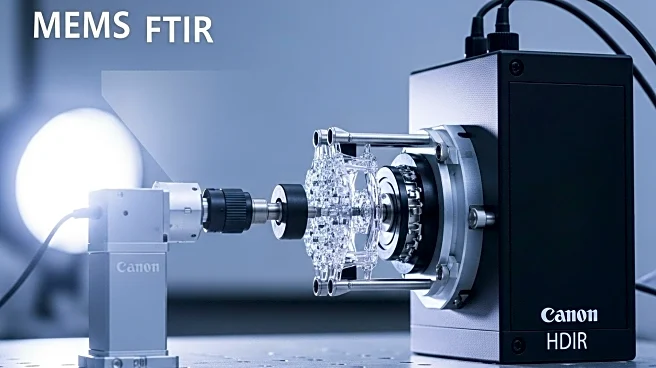What's Happening?
Recent advancements in MEMS-based FTIR spectroscopy have shown promise in improving the accuracy of COVID-19 detection. The study conducted at the Reference Laboratory for Egyptian University Hospitals utilized nasopharyngeal swab samples preserved in viral transport medium (VTM) for analysis. The samples were processed using RT-PCR and then subjected to optical spectroscopy analysis within 24 hours to ensure comparable viral loads. The research involved the use of near-infrared (NIR) and mid-infrared (MIR) spectrometers, with a focus on developing and optimizing devices for rapid and reagent-free virus detection. The study highlighted the importance of maintaining sample integrity and reducing outliers through automated algorithms and improved scanning protocols.
Why It's Important?
The development of MEMS-based FTIR spectroscopy for COVID-19 detection represents a significant advancement in public health diagnostics. By offering a rapid and reagent-free method, this technology could streamline testing processes, reduce costs, and improve accessibility to accurate diagnostics. The ability to detect the virus with high precision using optical spectroscopy could enhance early detection efforts, potentially leading to better containment and management of outbreaks. This innovation may also pave the way for similar applications in detecting other viral infections, thereby strengthening global health security.
What's Next?
The study suggests further refinement of the MEMS-based FTIR spectroscopy devices to minimize outliers and improve measurement accuracy. Future research may focus on automating sample insertion processes to reduce human error and enhance repeatability. Additionally, expanding the application of this technology to other viral pathogens could be explored, potentially revolutionizing the field of infectious disease diagnostics. Collaboration with healthcare institutions and regulatory bodies will be crucial to integrate this technology into routine clinical practice.
Beyond the Headlines
The ethical implications of using advanced spectroscopy for virus detection include considerations of privacy and data security, as the technology involves handling sensitive biological samples. Ensuring compliance with ethical guidelines and regulations will be essential to maintain public trust. Moreover, the cultural acceptance of new diagnostic technologies may vary, necessitating public education and engagement to address potential concerns and misconceptions.









